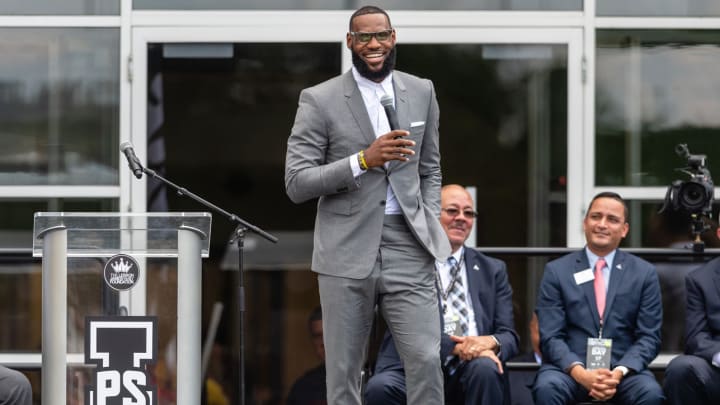LeBron James' Presence Looms Large Over Students In 'I Promise' Documentary

It’s hard to write about LeBron James without veering straight into hagiography. Greatest basketball player of all time. Most captivating athlete of a generation. Robbed of a supporting actor nod for Trainwreck. A new docu-series focused on James’s I Promise School in his hometown of Akron will make it even harder moving forward.
The doc, aptly titled I Promise, debuted Monday on the new streaming service Quibi, a portmanteau of the words “quick bites.” (The service provides content designed to be consumed in short bursts. The first five episodes of I Promise clock in at slightly over 40 minutes combined.) The series, directed by Marc Levin, follows students and teachers during the first year at the Akron public school that was the brainchild of James and his charitable foundation.
If you need a refresher (or you’re wondering why a public school needs a documentary), the I Promise School arrived with much fanfare in 2018, with its emphasis on trauma and social emotional learning. The educators who work with the kids—the first year was third and fourth graders, now it’s third, fourth, and fifth—believe the key to unlocking them academically starts with understanding them on a human level.
“It’s a really hard job,” Nicole Hassan, a liaison between the LeBron James Family Foundation and Akron Public Schools, told Sports Illustrated. “We have to build trust with the kids. You’d be surprised how many walls they put up. Once you break that down and build that trust, then you see them blossom academically and socially.”
Hassan said it was the most exciting time of her life when she became a part of the I Promise school, which is taking a decidedly different tack than other public institutions in Akron. The documentary follows the trials and tribulations of starting something from scratch.
The kids are selected via lottery for the I Promise school. The students are underprivileged, behind in their studies, and often dealing with unstable lives at homes. The documentary highlights kids like Nate, who can recall the exact manner of his father’s murder, or Dae’Shanna, who hides in her locker when she feels unsafe, or Scout, who knows how to help her mother when she suffers an epileptic seizure.
“They are dealing with so much other stuff,” director Marc Levin, who was at the school for the whole first year, told SI. “To see these kids become aware of what their own emotions are, and start to be self aware of when they’re angry, frustrated, when they’re creative. The emotional growth of some of these kids. That was the eye opener.”
The documentary is successful at both tugging at your heartstrings and making you think more broadly about how to properly educate kids who are deemed “at risk.” The most powerful scenes are when students who are acting out—whether it’s by fighting, shouting, or running away—are being met with hugs and hushed tones as opposed to anger. And the kids aren’t the only focus, as the emotional toll waged on the adults in charge of building the school from the ground up is charted as well.
The series is worth a watch. Even if you don’t care about James, his legacy, or basketball, the doc provides a rare look into a relatively new type of education, a way to tailor learning to the needs of those often left behind. (Hassan said the ultimate goal of the LJFF is to make the I Promise School a model for others around the country.) And if you do care about LeBron, you’ll be happy to know his presence looms large over the students who are now intertwined with his story.
“The kids’ admiration for him, all you have to say is, ‘How would Mr. LeBron feel about that?’ and they take a different route,” Hassan says. “The kids know that he is there for them and he is rooting for them. What’s inspiring for them is they know they can get through this because he did.”
The documentary concludes with the end of the first year at I Promise. Without giving away the ending (this information is public if you really have to know), it’s safe to say those involved with the school had to be pleased with the academic achievement of the students considering how new the program was for everyone involved, though there’s still room for improvement. Levin, who said he entered the project as a cynical New Yorker, described the kids’ progress as a “game changer.”
“These kids began to realize they lucked out, they were chosen,” Levin says. “And there’s a responsibility that comes with that.”

Rohan Nadkarni covers the NBA for SI.com. The Mumbai native and resident fashion critic has written for GQ.com, Miami Herald and Deadspin.